
Written by Ravindu
21 Oct 2024
I’ll tell you a story: let me know if it sounds familiar.
You were once passionate about the captivating realm of Biology, a field brimming with wonder that unlocks the secrets of life. You began exploring potential career paths, and like many of us, you compared job demand and salaries (let’s be real—who doesn’t?). It didn’t take long to discover that one of the highest-demand, and consequently highest-paying positions in the field of biology is computational biology, particularly for dry lab-focused roles like bioinformatics.
I’ve heard this story before; as a matter of fact, I’ve lived it! I learned about the existence of this exciting field, dove deeper, and realised how it blends seamlessly with computer science, medicine and even AI. Maybe I even fell in love with the possibilities it offers?
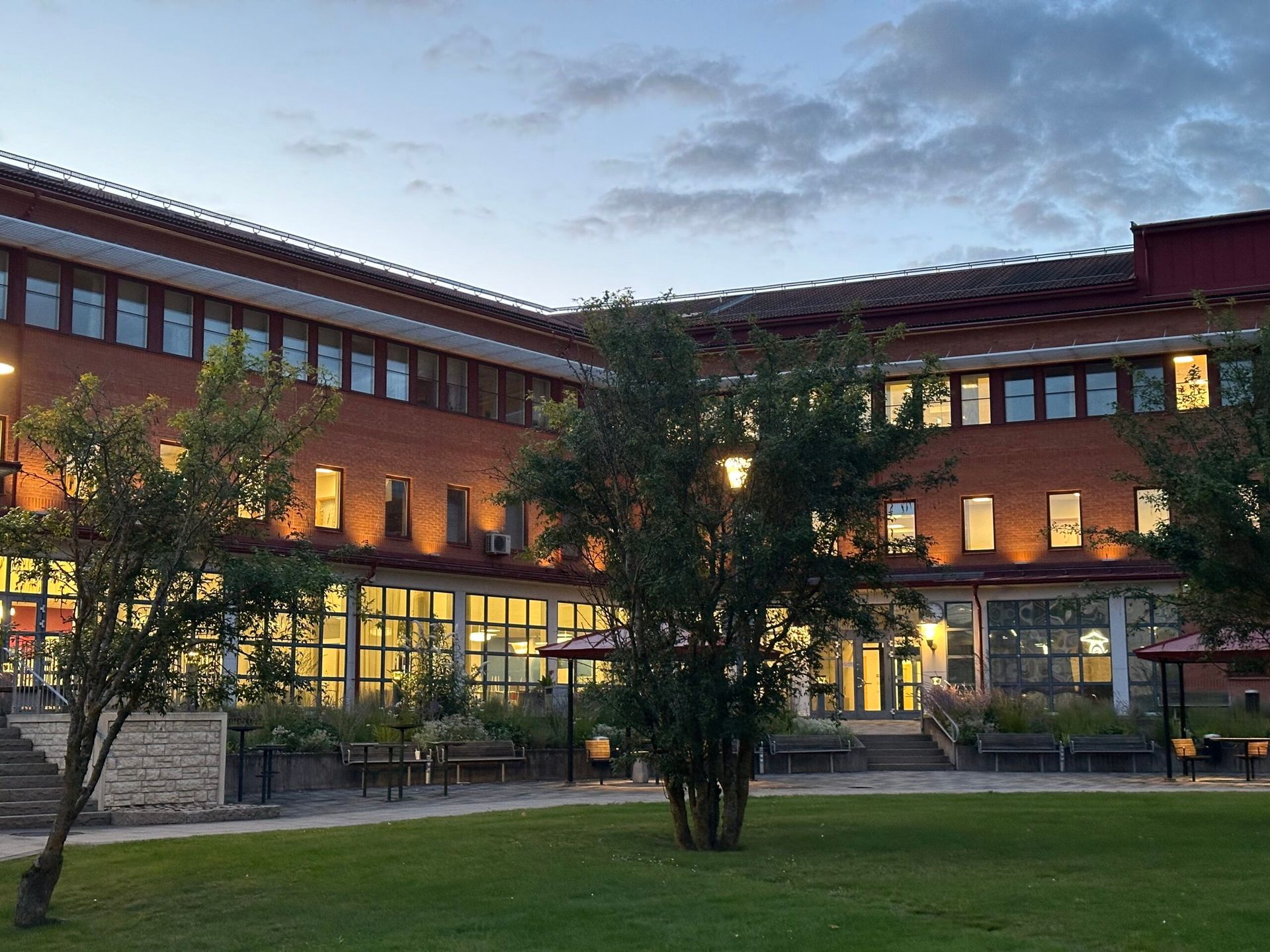
So, In September 2024, I started my Bachelor’s program in Molecular Bioinformatics at the University of Skövde. This came after months of searching for the perfect program across the globe. And let me tell you, finding english-taught programs focused on Computational Biology—especially at the Bachelor’s level—can feel like trying to find a single mutation in an entire genome (see what i did there?)
This got me thinking: there might be other students around the world who are passionate about pursuing a unique education that combines the fields of Biology and Computer Science. And Sweden, being the innovative, future-focused sustainable nation it is, has multiple options for you to choose from, in both the bachelors and masters level.
I’m here to share my experiences, tell you why I chose this field, give you an idea about the program structure, and where you can find bioinformatics programs in Sweden.
Let’s break it down- classic Q&A style!

Q: What is Bioinformatics?
Bioinformatics is often seen as a subfield of Computational Biology—the intersection where computer science, data science, and biology converge. While computational biology encompasses a vast array of applications, bioinformatics specifically focuses on analysing large amounts of biological data.
The Oxford English Dictionary defines bioinformatics as:
“The branch of science concerned with information and information flow in biological systems, esp. the use of computational methods in genetics and genomics.”
Honestly, I find that definition a bit too basic (sorry, Oxford 🤷♂️). Here’s how I’d put it:
“Building and using computational tools to solve complex biological problems, specifically to analyze large sets of biological data, allowing us to advance our understanding of biology, medicine, and other interconnected fields.”
Ah, yes… fancy—but it’s true!
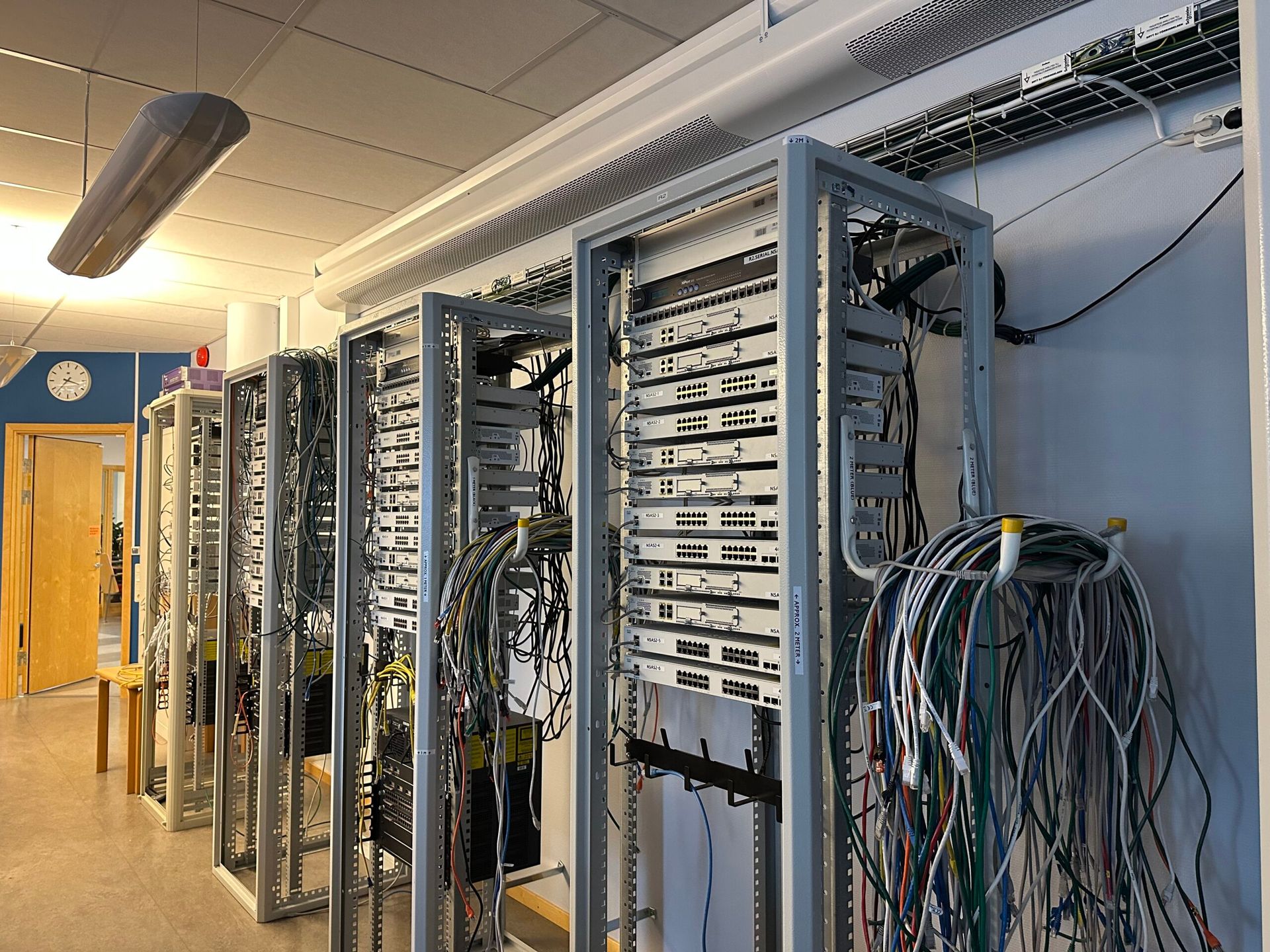
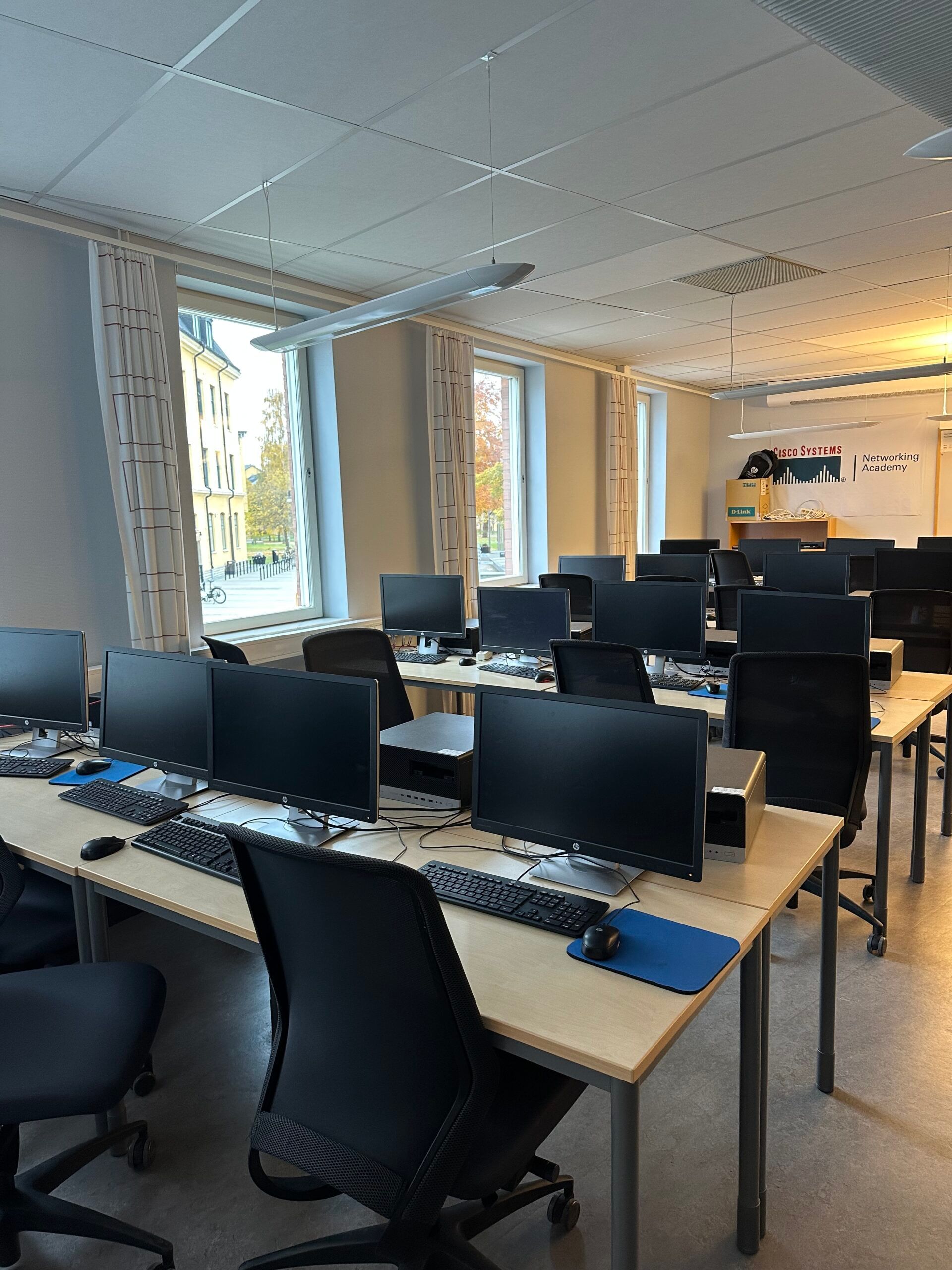
Q: Why Study Bioinformatics?
For me, computational biology and bioinformatics are some of the most fascinating subjects you can study today. Science has taken off in leaps and bounds over the past few decades, and the amount of biological data—think DNA and protein sequences—has skyrocketed. With that growth comes a huge need for analysis and discovery in almost every biology-related field. That’s where bioinformaticians come in, and trust me, the job market is booming. Nothing makes a university student perk up like hearing “increasing job demand,” am I right?
Why I Chose Bioinformatics:
After high school, I knew I wanted to dive deeper into biology, especially molecular biology. The biochemistry behind complex mechanisms in living organisms has always fascinated me. Combining that with computer science and data science felt like a modern twist that would equip me with skills for the future. Exploring the subject matter and current applications only made it more appealing—it’s clear that bioinformatics is vital in modern research!

Q: Why Sweden?
So, why should you consider Sweden for your bioinformatics journey? This country is not just about stunning nature and quirky traditions; it’s also at the forefront of scientific research and innovation. Here’s what makes Sweden a great choice for aspiring bioinformaticians:
- World-Class Research: Sweden is home to leading institutions like Karolinska Institutet and SciLifeLab, pushing the boundaries in life sciences and bioinformatics research.
- Industry Collaboration: With a robust biotech and pharmaceutical sector, you’ll find plenty of opportunities for internships and real-world projects—think collaborations with giants like AstraZeneca and innovative biotech startups
- Focus on Sustainability: Sweden leads the way in sustainability, and this ethos is integrated into research and development, especially in areas like genomics, drug discovery, and environmental data analysis
- Access to Funding: Scholarships and grants for international students make Sweden a financially attractive option, especially for those with research interests.

Q: Where Can You Study Bioinformatics in Sweden?
If you’re wondering where you can pursue bioinformatics in Sweden, you’re in luck! A great place to start your search is universityadmissions.se, the official Swedish application portal, where you can explore various programs and options available to you. Whether you’re looking for a full degree program or individual courses to supplement your studies, there are some fantastic opportunities across the country. Here’s a quick overview:
- Full Bachelor’s Program: University of Skövde (Hey, that’s where I study!)
- Independent Courses for Bachelor’s Students: Umeå, Uppsala, Skövde and more!
- Master’s Programs: Skövde, Lund, Karolinska Institutet, Uppsala (for students with a biology background, as well as computer science) and more!
Fun fact: The University of Skövde is the only university in Sweden that offers an English-taught Bachelor’s program in Bioinformatics!
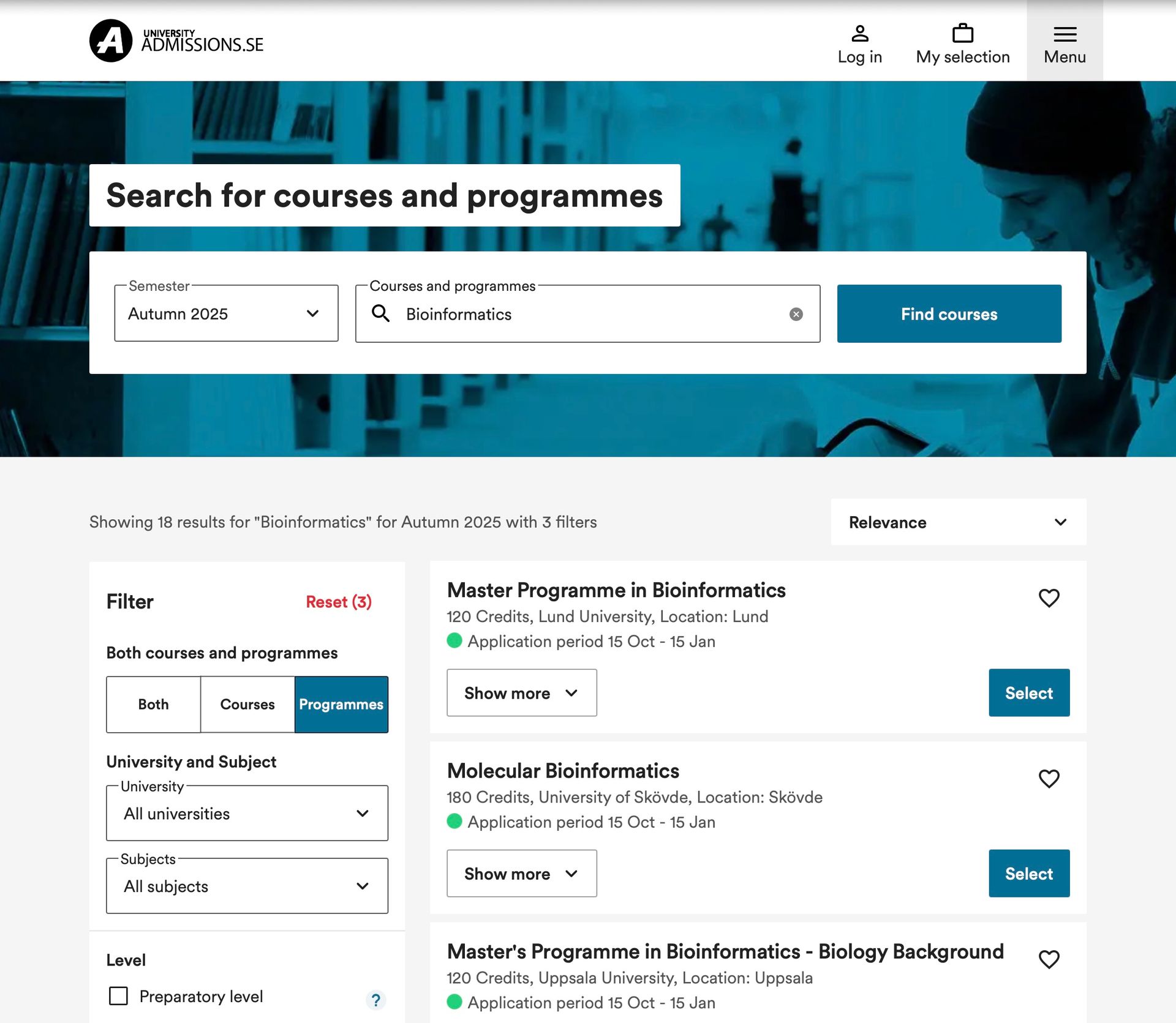
Q: What’s the Program Like?
Curious about what the actual program looks like at the University of Skövde? Let me break it down for you. This program is carefully designed to give you a solid foundation in bioinformatics while equipping you with the essential skills needed for programming and data analysis. Here’s a sneak peek into the curriculum, and what my experience has been like so far:
Year One
- Semester One: You’ll start by building a foundation in Basic Chemistry and Cell Biology, alongside learning to use essential software tools that you’ll rely on in future semesters.
- Semester Two: Get hands-on with programming languages like Python, focusing on how they’re used in bioinformatics. This semester dives into specific use cases, including genetics and microbiology, preparing you for more advanced applications later on.
Year Two
In the second year, the coursework ramps up:
- You’ll deepen your knowledge of both Python and R, applying them to real-world biological questions.
- You’ll also tackle statistics and discrete mathematics, vital skills for analyzing biological data. The focus here is on getting comfortable with the tools and concepts you’ll use when working with biological datasets.
Year Three
In the final year, you’ll bring everything together with practical and advanced projects:
- Semester One: Take on a programming project in bioinformatics and explore more specialised applications of bioinformatics. At the same time, you’ll learn software development, specifically tailored for the bioinformatics field, giving you hands-on experience in coding and data management.
- Final Semester: You’ll wrap up the program with a 30-credit Bachelor’s thesis project, where you’ll apply everything you’ve learned to tackle a complex bioinformatics challenge of your choice. This is your chance to showcase your skills and dive deep into a specific area that excites you.
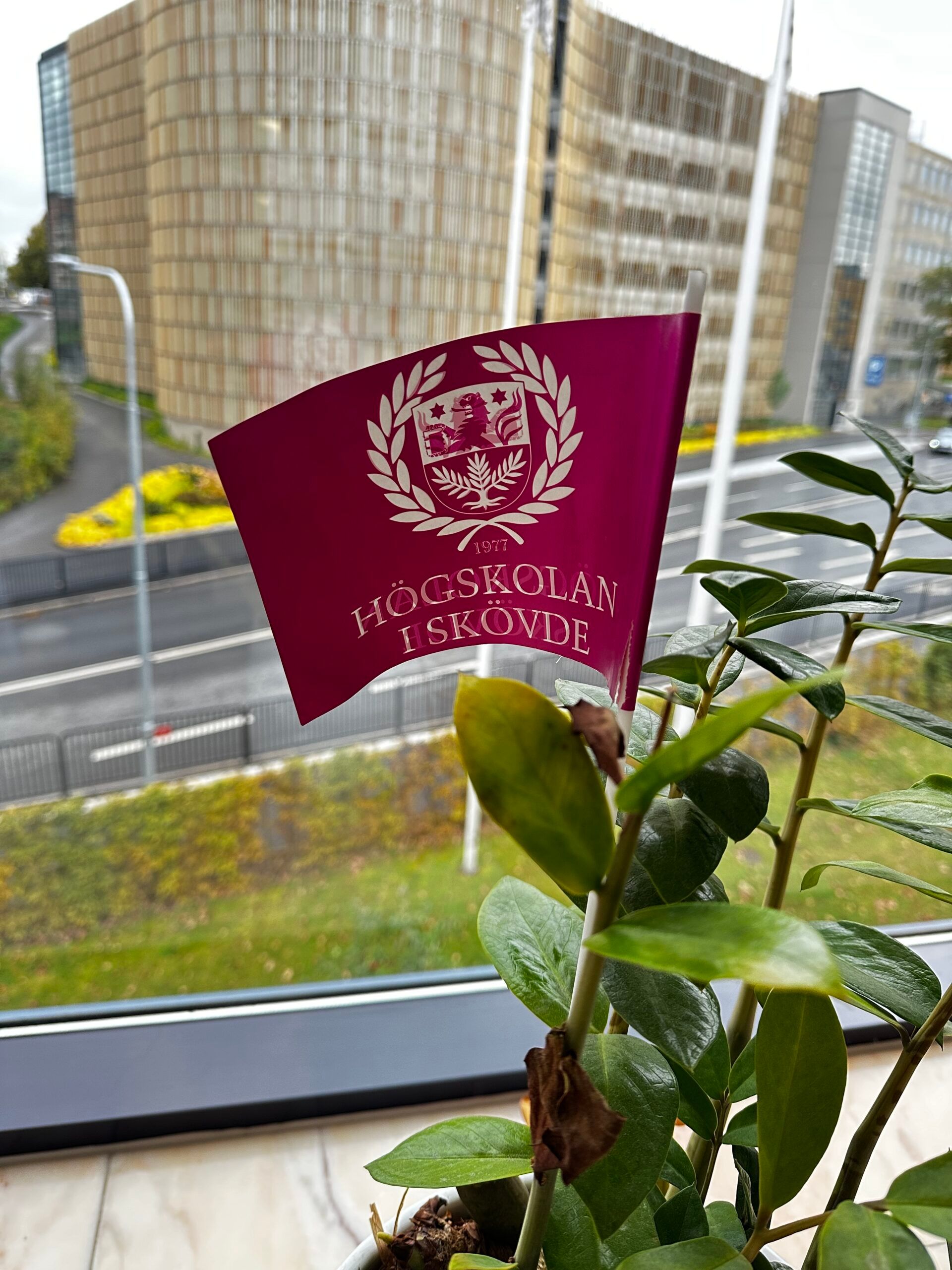
Wrapping it up
As I continue on this journey, I’m constantly reminded of how cutting-edge and essential bioinformatics is—not just for advancing science but for shaping the future of healthcare, environmental research, and more. Whether you’re considering studying bioinformatics in Sweden or elsewhere, I can promise you this: it’s a career path filled with innovation, discovery, and endless possibilities.
If you have any questions about the program, bioinformatics in general, or studying in Sweden, feel free to drop a comment below! And if you’re already on this path, I’d love to hear about your experiences too. Let’s keep the conversation going!





